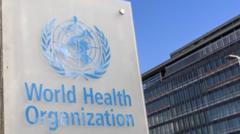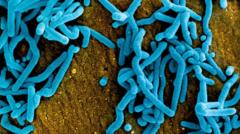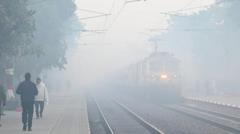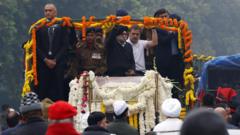Recent air quality monitoring has revealed a perilous AQI level in Delhi, prompting government interventions and raising alarm among residents.
Delhi Faces Severe Air Pollution Crisis as AQI Hits Alarming Levels
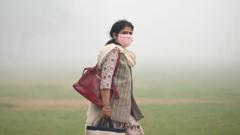
Delhi Faces Severe Air Pollution Crisis as AQI Hits Alarming Levels
The air quality in India's capital has deteriorated to hazardous extremes, causing widespread health concerns and disruptions.
Air pollution in New Delhi has reached alarming levels, with the Air Quality Index (AQI) soaring to a staggering 1,500, significantly surpassing the 300 threshold marked as hazardous by the World Health Organization (WHO). As thick smog envelops the city, residents are grappling with severe respiratory issues, leading to a public outcry for urgent action. This alarming air quality situation has prompted authorities to initiate drastic measures, including the closure of schools, suspension of construction activities, and a ban on non-essential trucks entering the capital.
The pollution crisis comes on the heels of an equally dire situation in Lahore, Pakistan, indicating a regional environmental issue. As the air quality continues to decline, experts caution that further interventions may be necessary to mitigate the immediate health risks. In a troubling classification, India’s pollution control authority has labeled Delhi's air as "severe plus," a designation that highlights the city's ongoing struggle with toxic air.
In a response to the crisis, the Delhi government has called for office personnel to work from home, aiming to reduce the number of vehicles on the road and improve air quality. Recent regulations have also prohibited the use of coal and firewood, as well as the activation of diesel generators for non-emergency use. However, the persistent problem of air pollution remains unsolved each winter, as factors such as crop stubble burning, vehicular emissions, and seasonal weather patterns exacerbate the situation.
On social media, Netherland's residents express their frustrations, with many describing painful throat conditions and calling for peaceful protests to demand cleaner air. Delhi's Chief Minister, Atishi, has echoed these sentiments, declaring a "medical emergency" due to unchecked stubble burning across the northern states of India. The political blame game continues as the ruling Bharatiya Janata Party (BJP) and the Aam Aadmi Party (AAP) trade accusations regarding their effectiveness in combating pollution.
As Delhi grapples with this grave environmental crisis, residents find themselves yearning for a resolution as they suffocate in dangerously polluted air.



